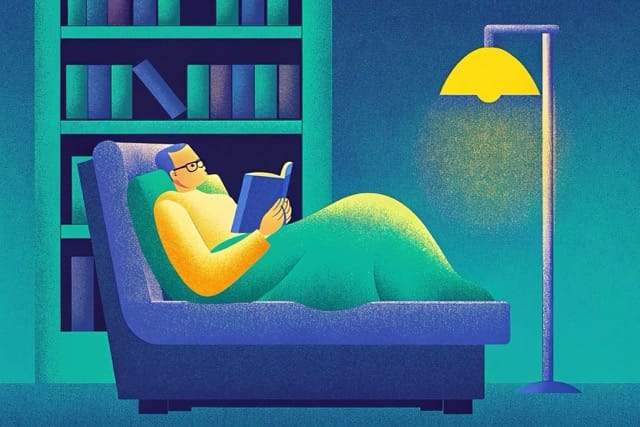Can Bedtime Stories Help with Insomnia and Anxiety
Explore how bedtime stories, particularly Dreamland Tapes, can serve as a soothing tool to alleviate insomnia and anxiety, promoting relaxation and restful sleep.

Have you ever found yourself lying awake at night, unable to quiet your racing thoughts, longing for a way to drift into peaceful sleep?
The solution might be more familiar than you think. Bedtime stories, a staple of childhood, have become an increasingly popular tool for adults seeking relief from insomnia and anxiety.

Stress And Anxiety Reduction
Bedtime stories are designed to calm the mind and body, often with soothing voice tones, gentle imagery, and a slow, relaxing pace. These elements work together to create a sense of safety and calm, which is crucial for managing stress and anxiety before bed.
When your mind is in a relaxed state, you’re less likely to replay the events of the day or worry about what’s ahead.
For adults, this practice of winding down may seem unconventional, but it works. Listening to tranquil, non-stimulating narratives engages the brain just enough to divert your focus from stress while promoting emotional calmness.
It’s a practice that brings immediate relief for those who feel overwhelmed or tense.
Distraction From Racing Thoughts
Everyone has experienced moments when intrusive thoughts take over just as you’re trying to fall asleep. These persistent worries or bits of unfinished business from the day can make drifting off seem impossible.
Bedtime stories act as a mental escape hatch.
By listening to a story, your brain shifts its focus from everyday stressors to the narrative being presented. This redirection works as a powerful distraction, grounding your thoughts in the present moment and allowing you to transition smoothly into a state of relaxation.
As opposed to letting your mind wander uncontrollably, the act of following a storyline can act as a gentle hand guiding your thoughts to a less stressful place.
Establishment Of A Bedtime Routine
Consistency in sleep routines is key to improving sleep quality and reducing anxiety around bedtime. Incorporating bedtime stories into your nightly rituals signals to your body and mind that it’s time to wind down.
Think of it as training your brain to associate this practice with rest and relaxation.
Having a structured bedtime routine isn’t just for kids; it plays an essential role in setting the stage for better sleep hygiene. When bedtime becomes predictable and calming, any anxiety about falling asleep can be significantly reduced.
Over time, this consistent habit helps your body develop a natural rhythm, enabling you to fall asleep more effortlessly.
Improved Sleep Onset And Quality
Falling asleep quickly and staying asleep through the night can feel like a challenge when you’re dealing with insomnia or anxiety. Bedtime stories help solve this by creating an environment conducive to sleep.
The soothing narrative and tranquil pacing send signals to your brain to release stress and welcome rest.
Studies have shown that practices like listening to bedtime stories can result in faster sleep onset and enhanced sleep quality. This isn’t just about falling asleep but also staying in deeper levels of restorative sleep for longer periods, which leads to waking up feeling more refreshed and rejuvenated.
Cognitive Benefits
While bedtime stories primarily serve as a relaxation tool, they also offer surprising cognitive benefits for adults. Engaging with narratives stimulates regions of the brain responsible for imagination, empathy, and problem-solving.
Even as you relax, your brain is quietly working through unresolved emotions or daily experiences.
This cognitive engagement can help you process certain thoughts or emotions and prevent them from reappearing as nighttime anxiety.
By allowing your mind to engage with a story that creates a safe mental space, you give yourself room to breathe and grow mentally, even as sleep approaches.
Passive Relaxation Technique
One of the most attractive aspects of listening to bedtime stories is their passive nature. Unlike reading, which requires active brain engagement and eye movement, listening only demands that you lie back and enjoy.
This makes bedtime stories an accessible relaxation technique, as it requires minimal effort from you.
It’s a particularly effective method for those too tired to concentrate on reading or meditation. All you need to do is press play and let the soothing voice guide you into deep relaxation.
The simplicity of this approach makes it easy to implement and stick to, especially on days when exhaustion leaves you feeling burnt out.

Emotional Processing And Healing
Narratives have a way of helping us understand and deal with life’s challenges. Bedtime stories can offer perspectives, reassurance, or even subtle solutions to problems, all without sounding preachy or overwhelming.
This can aid in emotional healing and provide comfort during stressful times.
Whether it’s a tale that mirrors your own struggles or one that transports you to a whimsical world, bedtime stories offer a quiet and reflective space for emotional processing.
As your mind shifts gears through storytelling, it supports healing and helps provide clarity on personal challenges.
Key Takeaways
- Bedtime stories promote relaxation and reduce anxiety by acting as a calming distraction, creating a sense of safety and tranquility.
- Incorporating bedtime stories into your nightly routine can train your brain to associate this habit with restful sleep and reduced stress, helping establish a consistent bedtime schedule.
Listening to bedtime stories fosters restful sleep, enhances cognitive processing, and facilitates emotional healing while serving as a passive, low-effort relaxation technique.
